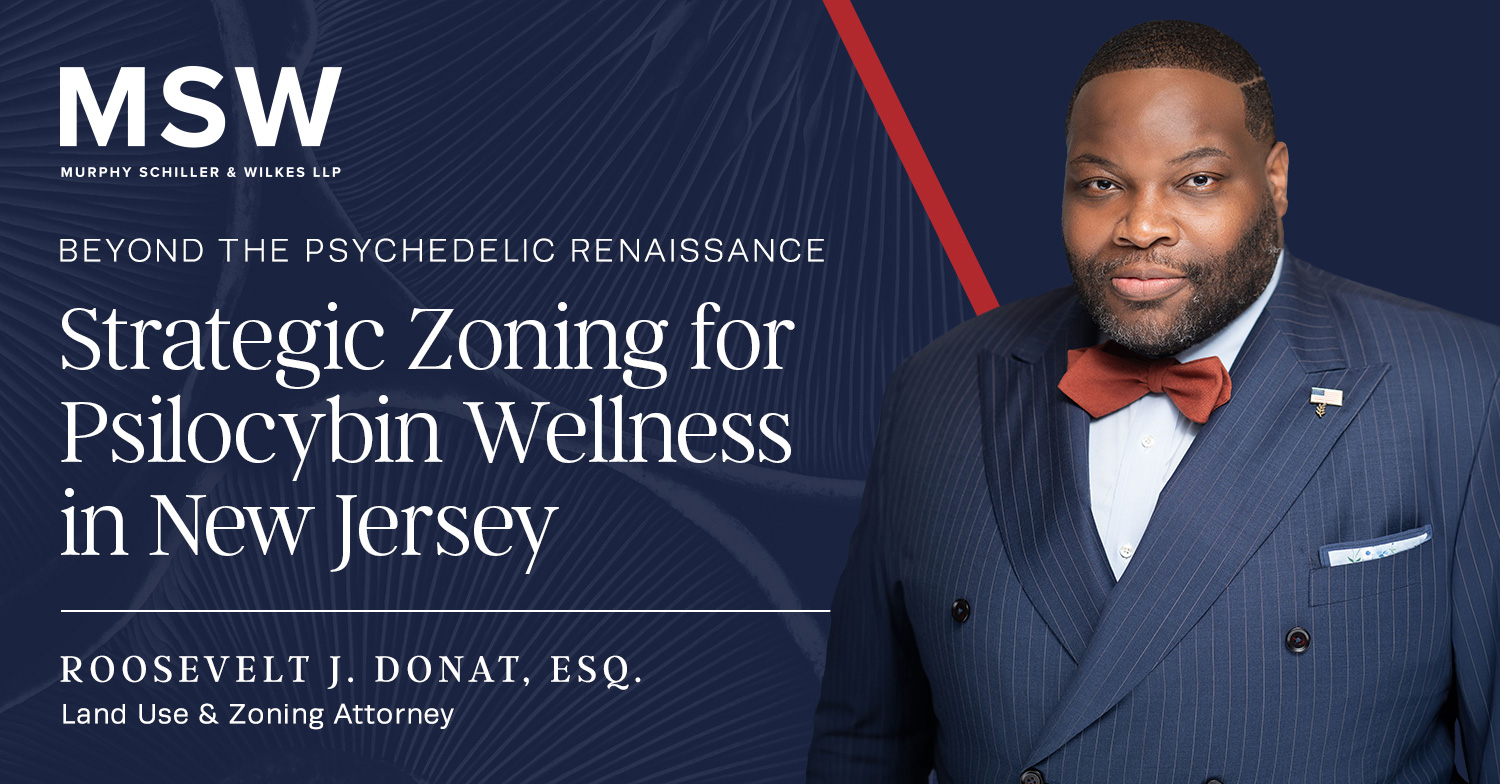
The regulatory landscape in the U.S. is evolving rapidly, with psychedelics emerging as a transformative frontier. New Jersey is poised to join other states in legalizing psilocybin by 2025, elevating zoning and land use law as a critical consideration. Senate Bill S2283, the "Psilocybin Behavioral Health Access and Services Act," represents a bold step toward regulating psilocybin production and therapeutic use, promoting health and wellness.
Introduced on January 9, 2024, by Senator Nicholas P. Scutari, the bill outlines a comprehensive framework for licensing, oversight, service delivery, and legal safeguards, including decriminalization and expunging past offenses. These developments present significant opportunities for attorneys, developers, investors, and lenders, but navigating this uncharted territory requires strategic legal expertise.
Key Provisions of Senate Bill S2283
- Regulatory Oversight:
Establishes a comprehensive licensing and compliance system for psilocybin manufacturing, testing, and service centers. - Advisory Board:
Creates a Psilocybin Behavioral Health Access and Services Advisory Board within the Department of Health to guide implementation and ensure best practices.
- Legal Protections:
Decriminalizes authorized psilocybin activities and expunges past offenses, providing safeguards for participants in the industry. - Community Engagement:
Allows municipalities to implement local restrictions, provided they align with state guidelines
These provisions position New Jersey among the pioneering states crafting a regulated framework for therapeutic psychedelics, drawing parallels to early cannabis legislation.
Why Municipalities Should Consider Psilocybin Wellness Centers
- Innovative Mental Health Solutions:
Psilocybin therapy offers evidence-based treatments for conditions like depression, PTSD, and anxiety, improving individual well-being and reducing healthcare costs. - Economic Growth and Tax Revenue:
Wellness centers boost local property values, generate tax revenue, and stimulate job creation, driving economic growth while enhancing public services. - Safe and Regulated Access:
Legalizing psilocybin ensures controlled administration in professional settings, reducing risks and fostering community trust. - Advancing Research and Innovation:
Partnerships with academic institutions position municipalities as hubs for cutting-edge research, attracting grants and bolstering their reputation. - Reduced Criminal Justice Costs:
Shifting from criminalization to regulation alleviates strain on the justice system, saving taxpayer dollars and reallocating resources effectively.
Navigating Zoning Challenges: A Roadmap for 2025
As psilocybin transitions from niche research to a commercial industry, businesses must overcome key zoning hurdles:
- Defining Psychedelics in Zoning Codes:
Collaborate with municipalities to draft precise ordinances that categorize psychedelics distinctly from medical or retail industries. - Addressing Stigma and Community Resistance:
Build public trust through transparent communication supported by data and community engagement. - Ensuring Compatibility with Existing Land Uses:
Strategically select sites to avoid conflicts, such as proximity to schools or residential zones. - Managing Special Use Permits and Overlay Zones:
Prepare for municipalities to require specific permits or zoning overlays, adding layers to the approval process.
We Have Been Here Before: Key Lessons from the Cannabis Industry's Evolution
The rapid growth of cannabis offers a blueprint for navigating the psychedelics industry:
- Start Early: Engage legal experts during site selection to anticipate zoning challenges.
- Educate Stakeholders: Provide data-driven presentations to reduce opposition.
- Iterate and Adapt: Plan for evolving regulations and build flexibility into business models.
Strategic Legal Counsel: The Key to Success
As a seasoned land use attorney, I provide expert guidance tailored to this emerging industry, including:
- Regulatory Advocacy: Drafting zoning codes that balance growth with community concerns.
- Community Engagement: Building stakeholder support for projects.
- Transactional Support: Ensuring compliance during property acquisitions and lease negotiations.
- Litigation: Defending clients against zoning appeals or unreasonable restrictions.
Why Developers and Investors Should Act Now
New Jersey’s progressive planning positions it as a leader in the psychedelics industry. Early adopters can secure first-mover advantages, but navigating this space requires expert legal guidance. With extensive experience in land use law, I am equipped to help you capitalize on these opportunities while avoiding regulatory pitfalls.
Future-Proofing Your Approach
Prepare for the psychedelics industry with these strategies:
- Collaborate with Experts: Engage multidisciplinary teams of attorneys, consultants, and regulators.
- Monitor Policy Developments: Stay informed on updates to zoning laws and legislation like S2283.
- Prioritize Flexibility: Design adaptable site plans to accommodate evolving regulations.
Psychedelics: Beyond Business
This industry is not just about economic potential—it represents a new era in mental health care. Thoughtful zoning policies can facilitate access to transformative treatments, supporting both public health and sustainable growth. Developers, investors, and lenders are not just funding businesses—they are shaping an industry with profound societal impact.
Shaping the Future, Together
As New Jersey prepares for the rise of the psychedelics industry, now is the time to act. Whether you are a developer, investor, or attorney exploring this space, I am here to provide the strategic guidance you need. Let’s work together to create zoning frameworks that foster innovation, drive economic growth, and respect community values.
Feel free to connect with me on LinkedIn to discuss emerging trends and opportunities. Together, we can build the future of psychedelics zoning.
Murphy Schiller & Wilkes LLP (MSW) is a boutique law firm servicing the commercial real estate and construction industries. Headquartered in Newark, New Jersey, the firm represents a wide range of clients, including institutional, publicly traded real estate companies, international and regional lenders, national contractors and subcontractors, and family offices. The firm has been ranked as a top law firm by both Chambers & Partners and U.S. News & World Report.